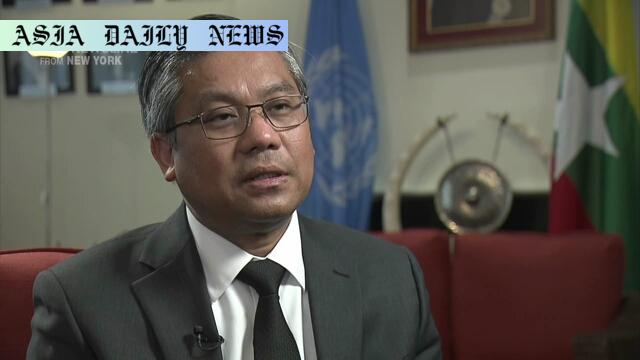Myanmar’s ambassador appeals for transparency and global aid to assist earthquake victims while criticizing military actions.
- Myanmar’s UN ambassador calls for urgent international aid for earthquake victims.
- He accuses the military junta of withholding aid from rural and pro-democratic areas.
- The ambassador emphasizes transparency and urges global pressure on Myanmar’s military.

Urgent Call for Aid: Myanmar’s Crisis Amidst Military Tensions
The Call for Global Assistance
The recent earthquake in Myanmar has brought the nation’s ongoing crisis into sharper focus, as Kyaw Moe Tun, the appointed United Nations ambassador by Myanmar’s ousted democratic government, made an impassioned plea for global aid this week. Speaking from New York, he underscored the critical challenges in ensuring affected populations receive timely and equitable support. His concerns reflect the dual tragedy faced by the people of Myanmar: a natural disaster compounded by systemic political turmoil.
Tun stressed that help from the global community is the only hope for many in the disaster-hit regions. He highlighted the profound need for transparency in delivering aid and ensuring that supplies are not manipulated or withheld. This plea for international intervention echoes the dire circumstances in many near-forgotten corners of the country, where governmental neglect and humanitarian barriers converge.
Military Hindrance to Relief Efforts
In his address, the ambassador pointed to significant obstacles created by Myanmar’s military government. Following the devastating 2021 coup, the junta has maintained tight control over aid and resources, imposing restrictions that disproportionately affect rural and pro-democratic communities. Tun accused the military of actively using relief aid as leverage, distributing it selectively to consolidate power while refusing critical aid to regions associated with the opposition.
These allegations raise concerns about the equity and humanity of the relief efforts in Myanmar. By complicating the delivery of aid, the regime risks exacerbating a humanitarian crisis that is already severe. The ambassador expressed deep skepticism regarding the junta’s recent purported ceasefire announcement, cautioning against believing such gestures are anything more than a calculated attempt to gain international favor.
The Role of the International Community
Kyaw Moe Tun’s appeal to the world was not only a call to action but an urgent reminder that transparency and accountability must take precedence in humanitarian operations in Myanmar. The ambassador implored the global community to monitor the distribution of aid and apply diplomatic pressure on the military junta. Without full access and fairness in relief efforts, hundreds of thousands could find themselves stranded without necessary resources or support.
The ambassador’s call also highlighted an underlying truth: sustainable solutions for Myanmar demand a broader intervention to address the ongoing political crisis. Emergency aid, while critical, is only a temporary solution. Real change will require global leaders to address the root causes of Myanmar’s prolonged instability—including the impacts of military rule on civilians.
Democracy and Humanitarian Justice
The heartbreaking realities highlighted by Kyaw Moe Tun cast a light on Myanmar’s long struggle for equity and freedom. For those suffering as a result of this disaster and ongoing oppression, the word “help” holds particularly significant weight. Tun’s concerns serve as a sobering reminder of how frequently humanitarian principles are violated during crises and how critical the international role is in sustaining hope for democratic and social justice.
As the global community responds to this call, ensuring fairness, equity, and effectiveness in relief measures should remain paramount. The dynamics in Myanmar point to challenges beyond disaster response—the suppression of democracy, basic human rights, and now equitable aid distribution. Without strong global pressure and a concerted effort to support the nation’s vulnerable populations, Myanmar risks descending further into turmoil and suffering.



Commentary
Commentary on Myanmar’s Humanitarian Crisis
Global Responsibility in Myanmar’s Crisis
The plea for international aid by Myanmar’s UN ambassador Kyaw Moe Tun has brought much-needed attention to the nation’s desperate humanitarian crisis. This should serve as a wake-up call for global nations and organizations to prioritize both relief and accountability in Myanmar. The challenges posed by the ruling military junta, as described by the ambassador, underscore the complexities of providing aid in politically fraught environments. Ensuring the sanctity of humanitarian assistance amidst these barriers is an imperative that should not be ignored.
Transparency: A Vital Component in Relief Efforts
Tun’s remarks on the importance of transparency resonate deeply. Relief efforts cannot truly succeed without equitably reaching those in need, regardless of their political affiliations or geographical location. The junta’s selective distribution of aid is not only morally indefensible but also creates a dangerous precedent, where political agendas overtake humanitarian imperatives. Holding the Myanmar military accountable through diplomatic and public pressure is essential to ensuring relief efforts are not rendered ineffective or weaponized.
A Wake-Up Call for Broader Change
While the current focus is rightly on mitigating the earthquake’s devastation, Myanmar’s crisis demands broader solutions. The global community must recognize that without addressing the underlying political instability inflicted by the 2021 coup, humanitarian crises like these will continue to plague Myanmar. In addition to immediate aid, the world should advocate for long-term solutions that prioritize democratic restoration and human rights in the region. This is an opportunity for global leaders to demonstrate their commitment to humanity—not just through words but through decisive and conscientious action.